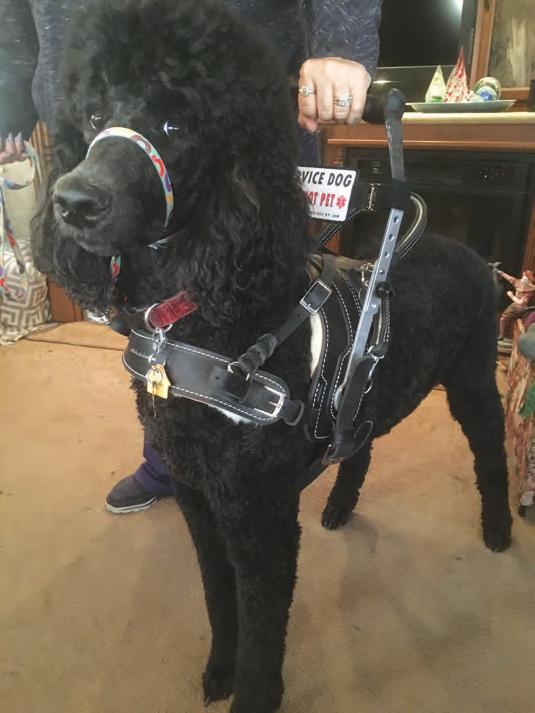
4 minute read
What Does It Mean to Be a Service Dog?
By Lori Carman, Dream Dogs
What is a Service Dog?
Advertisement
According to Titles II and III of the Americans with Disabilities Act (ADA), “A service animal is any dog that is individually trained to do work or perform tasks for an individual with a disability. Service animals can benefit individuals with a wide range of disabilities, including a physical, sensory, psychiatric, intellectual, or other mental disability.” Under the law, service dogs may be home trained or trained by a professional. The law was written in this manner so there would be no undue expense to the individual. Any service dog should be properly socialized, have good manners, be obedient, and perform specifically trained behaviors to assist the owner. Often, this requires the assistance of a professional trainer who knows how to build a working, functioning service dog partnership.
Service dogs can be trained to help with many tasks. Just a few include:
• Alerting a person with hearing loss to a sound (hearing assistance dogs)
•Assisting individuals who are blind or have low vision with navigation (guide dogs)
• Assisting an individual during a seizure (seizure alert dogs)
• Reminding a person to take medication (alert dogs)
• Providing physical support and assistance with balance and stability to individuals with mobility disabilities (mobility assistance dog)
• Helping individuals with psychiatric and neurological disabilities by preventing or interrupting impulsive or destructive behavior (psychiatric service dogs)
Generally , a service dog is allowed to go wherever the person with the disability can go, meaning that they can go wherever the public is allowed to go. That includes but is not limited to restaurants, hospitals (other than sterile environments like operating rooms and ICU), grocery stores, movie theaters, public transportation, libraries, department stores, and other public places. The ADA requires a service dog to be under control at all times, either by proper equipment or voice command. The dog must be house broken. It is not proper or safe to have your service dog on a retractable lead. Service dogs need to work with their feet on the ground, not from a baby stroller or worse yet, in a grocery cart. Service dogs should be well mannered. Quiet. Barely noticed. After all, they are like durable medical equipment. When working, they are not to interact with the public. They cannot be focused on the needs of the disabled individual if they are playing with someone else or another dog! The animal should be vaccinated in accordance with state and local laws. They must be licensed in accordance with local codes—in California, service dogs have a specialized dog licensing process. Licensing fees are waived. A veterinarian must complete a form on the dog’s health and suitability for the tasks it is being asked to perform.
Service dog owners beware! There are no formal certification systems that are required or approved by the ADA. Although highly advised, service dogs are not required to wear vests or badges identifying them as a service dog. Vests, certificates, registrations, and medically required letters, are all available on the internet but none are required by or recognized by the ADA.
What is an Emotional Support Dog?
While emotional support dogs or comfort dogs are frequently used as part of a medical treatment plan as therapy animals, they are not considered service dogs under the ADA. These support animals provide companionship, relieve loneliness, and sometimes help with depression, anxiety, and certain phobias, but do not have special training to perform tasks that assist people with disabilities. Emotional support dogs have limited rights under the ADA—generally, they cannot be discriminated against for housing or air travel, but it does not grant the same right of access to public places as a service dog. Therapy dogs provide people with therapeutic contact, usually in a clinical setting, to improve their physical, social, emotional, and/or cognitive functioning.
Resist the Temptation
Many of us love the company of our dogs and enjoy having them with us as much as possible. As a professional dog trainer, who helps train service dogs, I hope you will not bow to the temptation of trying to pass your companion off as a service dog to bring it into a business that only allows service animals. My own personal dogs are well trained, and I would never consider bringing them into a Costco, grocery store, or indoor-only restaurant. If I want their company, I choose a location that allows dogs—like a restaurant with a pet-friendly patio. For the health and safety of all citizens, please leave your pet at home if it is not a true service dog.
The lives of the people who rely on service dogs can be challenging, sometimes even accomplishing the smallest of tasks that others may take for granted. Thank goodness they have the gift of this living, breathing, thinking partner to help them maneuver their way through life! Let’s honor that priceless, life-giving relationship by giving it the respect it deserves.
Lori Wainio-Carman, VSPDT, professional dog trainer and owner of Dream Dogs, has been successfully training for more than 20 years. 760-899- 7272, dreamdogs.com, Positively.com







